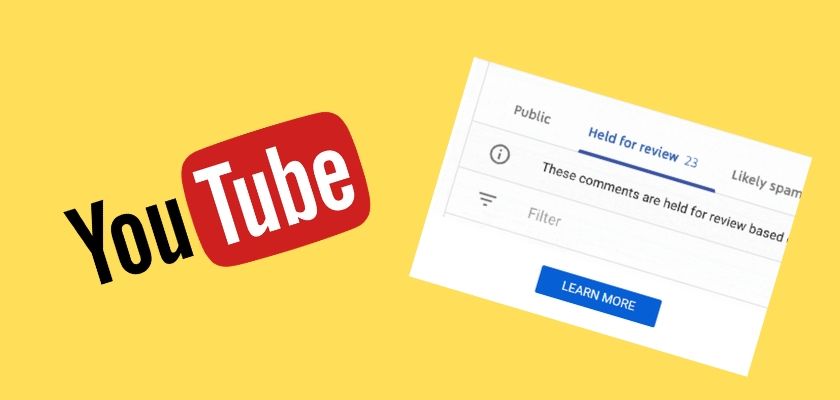War is peace, freedom is slavery – and – could algorithmic censorship be moderation?
On that last point, there’s no arguing that comment moderation – by humans – anywhere on the web is hard, unrewarding, and often dirty work. And so, who wouldn’t want to offload it onto somebody else?
The latest feature to be introduced to Google’s YouTube shows that the tech giant certainly would like to do that – as its long march towards fully complying with the demands to introduce more censorship across all its platforms continues, steadily.
Now – YouTube is a very visible and influential part of the Google empire – so perhaps unsurprisingly a lot of action aimed towards containing and controlling speech has lately been happening precisely there.
“Held comments”
This new feature that YouTubers can “enjoy” is called “held comments” – and it has now been turned on by default. What this means is that Google’s algorithm of appropriateness, so to speak, automatically flags comments it finds unacceptable – and then leaves it to the human creator to go through all these and approve, hide, or report any of the lot.
In other words, creators are forced to team up with Google’s algorithm – which remains a tool utterly imperfect and ill-suited for the kind of fine-grained effort that is fair moderation.
Not only that, but creators will work for free to help YouTube “better moderate” its own platform – while at the same time taking the responsibility and any flak from any perceived errors that might arise from their decisions.
After all – Google leaves it to you, their creators, to decide. It’s something like this: We, the Google, think it’s a bad idea to let these comments through – but you just go ahead and do what you think is best.
And spending your time and effort on training Google’s AI-powered algorithm for free is always welcome. As per this Google Support resource entry:
“As you review [held comments] the system will take that feedback into account and, over time, get better at identifying the types of comments to hold for review.”
YouTube also promised that this only applies to new comments on videos and community posts – but not to live chats.
For some of the bigger channels, this will no doubt turn out to be a massive amount of work – if they decide to actually review every comment YouTube had flagged automatically.
The easy way out for may creators will be to just admit that YouTube has worn them out – and then proceed to blanket ban comments that Google’s algorithm has already said are bad.
But it might be good to keep in mind that with this new system, as a YouTube creator, it is you, not Google, who might end up censoring free speech on the platform.
Hard work
In addition, Google’s decision to make their “potentially inappropriate comments held for creator’s review” an opt-out – in other words, to introduce a feature, and then let the user figure out how to get out of it in a myriad of settings – is simply problematic.
All too often, users don’t even know there’s an option to turn the feature off, let alone where to find it – therefore opt-outs of controversial or potentially controversial features are what one might call the last refuge of a tech scoundrel.
The “good news” is that the guinea pig channels – before the feature had been made an opt-out – “experienced a 75 percent of comment flags!”
“Now you can spend more time with your audience and less time sifting through those verbal sticks and stones.”
Google seems to be playing the convenience card here, and it’s a card that hardly ever loses in the consumer-oriented tech.
All the wrong reasons
As for suppressing comments for many wrong reasons in the past – YouTube has a rich history, documented in several Reclaim the Net articles.
Earlier this month our report said that platform seems to be facing blanket ban modes even on channels promoting diversity around children with disabilities – as a means of balancing off “a series of scandals involving videos for kids that had been edited to include the promotion of self-harm, and the discovery of predatory behavior in the comments of specific videos.”
In February, YouTube said it would “mass disable comments” as a supplemental measure to make creators “moderate” better – or face demonetization.
And just to keep us on our toes and aware that Android, too, is a Google platform – the company last month announced YouTube was looking to control what its users can and cannot say by “testing a new layout which hides comments behind a button” – and the test was designed for “some users in India.”
We’re still eagerly awaiting the results of that one.










